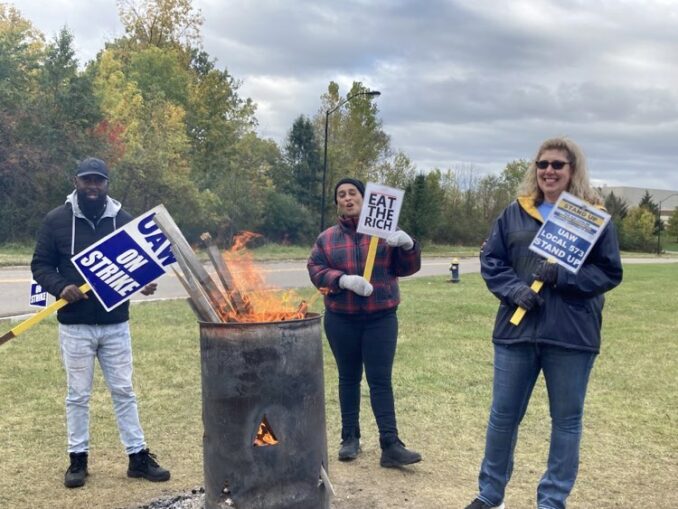

Stellantis strikers outside the parts distribution center in Streetsboro, Ohio, Oct. 15, 2023. (WW Photo: Martha Grevatt)
Nearly 9,000 Ford workers at the Kentucky Truck Plant added their numbers to the 25,300 United Auto Workers members already striking the Big Three auto companies on Oct. 11. Over 100,000 Ford, General Motors and Stellantis workers who remain at work are ready to walk out when the UAW leadership gives the signal.


Stellantis strikers outside the parts distribution center in Streetsboro, Ohio, Oct. 15, 2023. (WW Photo: Martha Grevatt)
KTP is Ford’s most profitable plant, generating $25 billion in revenue per year — more than some Fortune 500 companies. “That’s $48,000 a minute,” said UAW President Shawn Fain, speaking to union members Oct. 13 on Facebook live. “Our labor at Kentucky Truck generates more revenue each minute than thousands of our members make in a year.”
The decision to take out KTP was made around 6 p.m. after a brief meeting between union negotiators and Ford management representatives. Fain and the negotiating team became incensed when Ford bosses made the same offer they had rejected two weeks prior, with no improvements. By 6:30 p.m., workers were streaming out of the plant in droves and immediately setting up picket lines.
Prior to that Wednesday evening, Fain was announcing every Friday which plants or warehouses, if any, would be joining the strike. Now there is an added element of surprise, making it even harder for Big Three bosses to plan production. Workers at any facility could be asked to “stand up and walk out” at a moment’s notice.
Solidarity with UAW strikers continues to grow. A recent Associated Press poll showed only 9% of respondents had sympathy for the auto companies. Autoworkers from Italy, England and Brazil recently traveled to the U.S. to walk the picket lines with their U.S. counterparts. Restaurants and bakeries are giving strikers free food.
While the three companies have upped their offers in regards to pay raises and other contract terms, the two antagonistic class groupings have not reached agreement on key issues, such as pensions and health insurance for lower seniority workers when they retire, and making everyone a permanent employee after 90 days. GM, Ford and Stellantis want to maintain the divisive, multi-tier pay and benefit structure, paying future workers less.
“We’re not messing around,” Fain declared. “Why is it when they kill thousands of jobs it’s business as usual, but when working-class people stand up and ask for more it’s a crisis?. … The working class in this country is fed up with being bullied by rich corporations and the wealthy. The working class in this country is sticking together.”
As we observe the ongoing negotiations between the United States and Iran, we, the undersigned,…
Hamas issued the following statement on April 24, 2025, published on Resistance News Network. The…
By D. Musa Springer This statement is from Hood Communist editor and organizer D. Musa…
Portland, Oregon On April 12 — following protests in Seattle and elsewhere in support of…
This statement was recently issued by over 30 groups. On Friday, March 28, Dr. Helyeh…
When Donald Trump announced massive tariffs on foreign imports April 2, Wall Street investors saw…